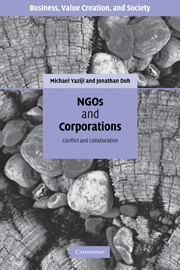Book contents
- Frontmatter
- Contents
- List of figures
- List of tables
- Preface
- Foreword
- Acknowledgments
- Part I Understanding NGOs
- Part II NGO advocacy campaigns
- Part III Corporate–NGO engagement
- 7 Corporate–NGO engagements: from conflict to collaboration
- 8 Globalization, multinationals and NGOs: the next wave
- Case illustration: conflict diamonds
- Case illustration: Unilever in Indonesia
- Case illustration: microfinance and poverty reduction
- Part IV The future of corporate–NGO relations
- Index
- References
Case illustration: Unilever in Indonesia
Published online by Cambridge University Press: 13 January 2010
- Frontmatter
- Contents
- List of figures
- List of tables
- Preface
- Foreword
- Acknowledgments
- Part I Understanding NGOs
- Part II NGO advocacy campaigns
- Part III Corporate–NGO engagement
- 7 Corporate–NGO engagements: from conflict to collaboration
- 8 Globalization, multinationals and NGOs: the next wave
- Case illustration: conflict diamonds
- Case illustration: Unilever in Indonesia
- Case illustration: microfinance and poverty reduction
- Part IV The future of corporate–NGO relations
- Index
- References
Summary
In the mid-2000s, Unilever Corporation engaged with Oxfam to explore and document the impact of Unilever's presence in Indonesia on poverty and development. Oxfam GB, Novib (Oxfam Netherlands), Unilever and Unilever Indonesia (UI) collaborated on this research project which explored the link between international business and poverty reduction. In particular, the report detailed the positive and negative effects that UI had on poverty in Indonesia. This joint research project resulted in a comprehensive report that has been widely disseminated and is viewed by many as an important example of objective and sincere exploration of the impact of a multinational on the host country in which it does business.
UI, which was founded in 1933, had $984 million in sales by 2003. The majority (84 percent) of sales were derived from home and personal care products, such as soap powder, household cleaning products, soaps and shampoos. The remaining sales were generated from foods such as tea, margarine and ice cream. UI ranks as the thirteenth largest company in Indonesia by sales, and the fourth largest in the fast-moving consumer goods (FMCG) sector. Based on Unilever estimates, at least 95 percent of Indonesians use one or more UI products annually, while 90 percent of poor people in Indonesia buy UI products yearly. Approximately half of Indonesia's population makes less than $2 per day. Marketing to people in poverty presents a number of challenges.
- Type
- Chapter
- Information
- NGOs and CorporationsConflict and Collaboration, pp. 166 - 168Publisher: Cambridge University PressPrint publication year: 2009



